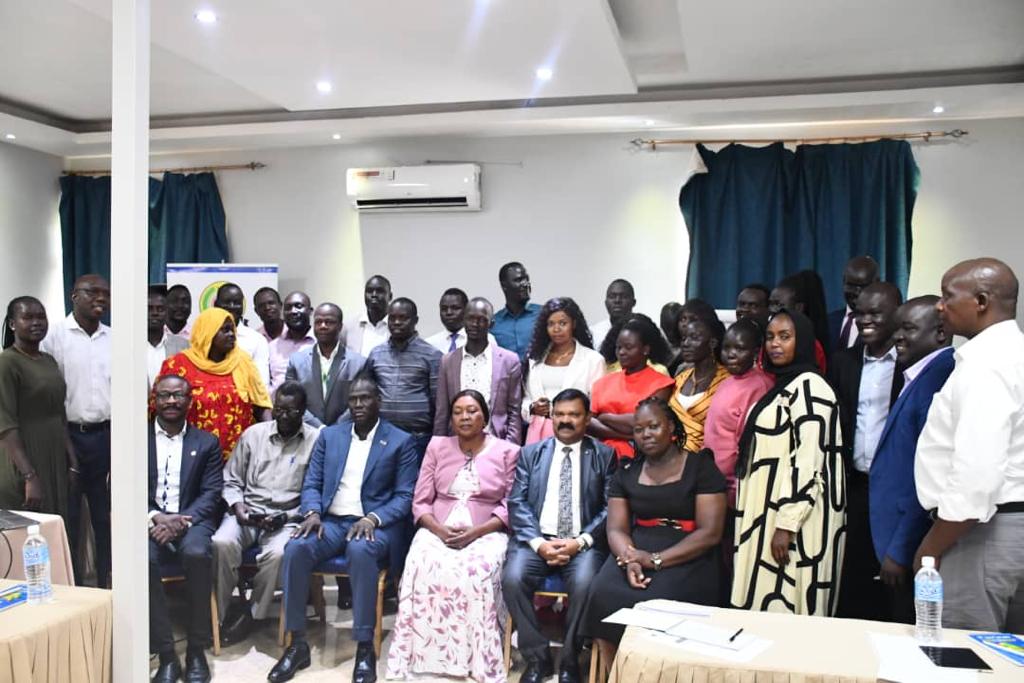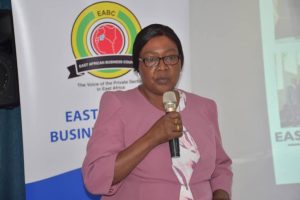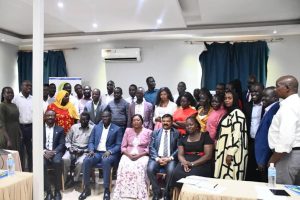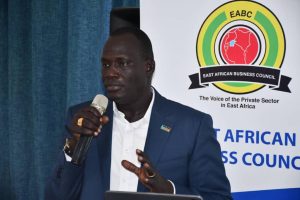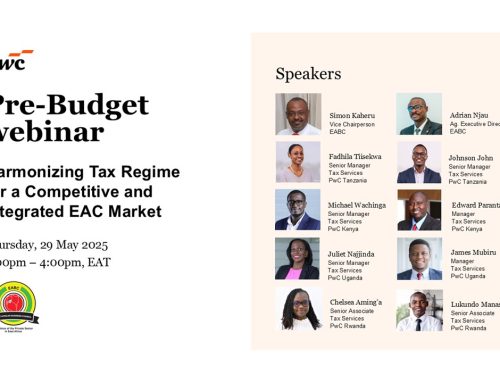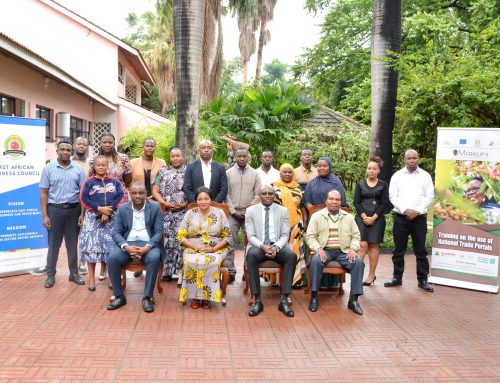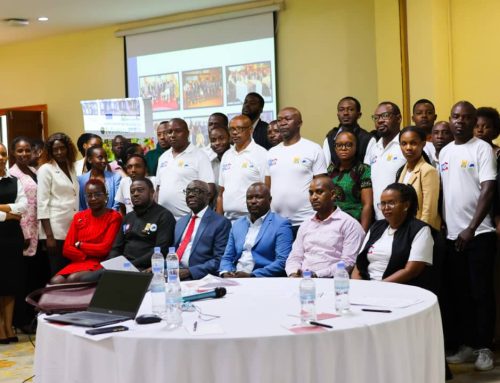Thursday, 23rd November 2023, Juba, Republic of South Sudan: The East African Business Council (EABC), in partnership with GIZ – Support to East African Integration Programme Project II, has enhanced the knowledge of 48 members of business community engaging in value addition of the priority sectors of agri-business, manufacturing, leather, pharmaceuticals, transport & logistics and fruits & vegetables on the African Continental Free Trade Area (AfCFTA) Trade in Goods Protocol.
In official opening of the workshop Ms. Christina Peter Jabakana, Director General for Administration from Ministry of EAC Affairs, Republic of South Sudan said that the workshop is very important in inspiring and encouraging South Sudanese private sector taking abundant opportunities presented by African Free Market to be created by implementation of AfCFTA.
“Let use this workshop to identify likely challenges private sector in South Sudan may encounter when start trading under AfCFTA in order to come up with effective strategy of resolving them.” She said.
She concluded her remarks by reiterated government commitments of creating conducive business environment which will create vibrant private sector in South Sudan capable of driving national economy as private sector is engine of growth.
Mr. John Lual Akol Akol, the First Vice Chairperson of South Sudan National Chamber of Commerce Industry and Agriculture (SSNCCIA), “Implementation of AfCFTA Agreement comes with benefits and challenges which have implications to businesses which make it very critical for private sector to be aware”. He said.
He urged South Sudan Government to ratify the AfCFTA agreement in order to make Republic of South Sudan legal and binding Party State of the Agreement as country continue to sensitize both private and public stakeholders.
“The AfCFTA provides expanded market of 1.3billion and 3.4 trillion combined GDP to South Sudan products in addition of EAC market which South Sudan is a member” He said.
Currently the EAC Trade and Investment Statistics indicate that South Sudan’s merchandise total trade increased to USD 443.6 million in 2022 from USD216.7 million in 2021, while the trade balance deteriorated to USD436 million in 2022 from USD147.1 million in 2021. South Sudan’s main merchandise exports include crude oil, wood and minerals, while the main imports into the country comprise food products, petroleum products, and household consumer goods.
In EAC Regional Economic Communities (RECs)’ continue to be the major export destinations while China and the EU remain the dominant source markets. As such EAC total trade increased by 13.4 percent to US$74,030.9 million in 2022 from US$65,268.9 million in 2021. In 2022, EAC total exports to the rest of the world (RoW) were valued at US$20,139.4 million and EAC total imports from the RoW amounted to US$53,891.48 million thereby recording and EAC recorded a trade deficit of negative US$33752.1 million in 2022. Total Intra-EAC trade grew by 11.2 percent to US$10,910.9 million in 2022 from US$9,810.4 million xiv in 2021, whereas the percentage share of Intra-EAC trade to EAC total trade stood at 15 percent in 2022. In 2022, Intra-EAC exports amounted to US$6,366.27 million while Intra-EAC imports amounted to US$4,544.63 million. The major Intra-EAC traded products are cereals, cement, iron and steel, live animals, petroleum products, sugar, foods and beverages.
Mr. Adrian Njau, Trade & Policy Advisor with EABC, said the AfCFTA provides preferential market access for Burundian products to whole African market which will enable South Sudan to diversify its imports and exports. He challenged South Sudan private sector to get ready for opportunities and challenges presented with wider market.
He said that given that this week the Republic of Sudan will become the Chairperson of EAC gives more responsibilities to the country in terms of implementation EAC and AfCFTA commitments,
“As Government of Republic of South Sudan prepare to implement EAC and AfCFTA commitments its role of private sector to actualize these commitments by starting trading under EAC and AfCFTA trade arrangements.” He said.
He thanked South Sudan National Chamber of Commerce, Industry and Agriculture for collaborating with EABC in organizing the workshop in South Sudan and committed to enroll more workshops engaging other areas of Agreement which include Trade in Services, Women and Youth in trade.
Focused on imparting knowledge on trading in goods, the two-day workshop is intending to enhance participation of South Sidan’s private sector in the EAC and African integration through seizing the opportunities of trade and investment under AfCFTA trading arrangements. The training covered the AfCFTA Trade in Goods Protocol and its annexes (Rules of Origin, Tariff Concession, and Non-Tariff Barriers) and its implications for businesses in the EAC bloc.
The fully implementation of the AfCFTA is set to create a liberelised single African market for goods and services driven by free movement of people and capital across the continent. The EAC Partner States have great potential to export agricultural products, mineral and value-added manufacturing products to African countries under AfCFTA trading arrangements.
Supported by GIZ the two-day workshop was organized by the East African Business Council (EABC) in collaboration with South Sudan National Chamber of Commerce, Industry and Agriculture (SSNCIA).

